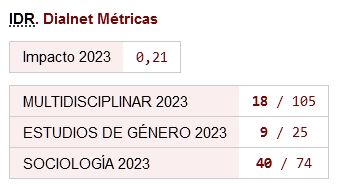Violation of the prohibition of non-discrimination by Spanish labour courts when dealing with prostitution
DOI:
https://doi.org/10.46661/relies.4975Keywords:
sex work, prostitution, employment and labour rights, freedom of association, non-discriminationAbstract
The right not to suffer discrimination requires that people who choose to engage in sex work in order to meet their economic needs receive full recognition of their employment and labour rights. This includes prostitution. In this field, however, Spanish labour courts do not adhere to the protective spirit of Labour Law. Instead, they add to the vulnerability of prostitutes by denying them protection. To this end, they apply criteria that are not always strictly legal, relying on wilful arguments that often disregard the law. The result is the discrimination of prostitutes, a collective historically subject to persecution, as no reasonable argument is provided to justify their pejorative differential treatment. The protection of women as a whole -in terms of gender equality-; the need to overcome the social “nuisances” prostitution causes; the need to fight against human trafficking; the alleged desire to defend prostitutes’ dignity -while paradoxically harming it, as prostitutes are treated as minors-; appealing to these aims, and depriving prostitutes of rights as a means to reach them, does not pass the proportionality test (suitability, necessity and balancing tests) unequal treatment must meet to be considered non-discriminatory. The underlying consideration is that, despite human rights’ universal character, prostitutes cannot be regarded as their holders.
Downloads
References
Acton, W. (1870): Prostitution, considered in its moral, social and sanitary aspects, Londres: John Churchill and sons.
Alonso Olea, M. (1971): “Sobre la realidad subyacente al Derecho del Trabajo”, Revista de Trabajo, 2, pp. 148-161.
Beltrán, E. (2011): “En los márgenes del derecho antidiscriminatorio: prostitución y derechos de las mujeres”, Anales de la Cátedra Francisco Suárez, 45. Disponible en https://revistaseug.ugr.es/index.php/acfs/article/view/524. Último acceso el 8 de agosto de 2020.
Brufao, P. (2008): Prostitución y políticas públicas: entre la reglamentación, la legalización y la abolición, Estudios de progreso. Fundación alternativas. Disponible en http://www.fundacionalternativas.org/public/storage/estudios_documentos_archivos/xmlimport-jPZHqj.pdf. Último acceso el 8 de agosto de 2020.
De la Villa, L.E. (1969): “En torno al concepto del Derecho español del Trabajo”, Revista de Trabajo, 26, pp. 103-118.
Fita Ortega, F. (2007): “El trabajo sexual en la doctrina judicial española” en Prostitución y trata: marco jurídico y régimen de derechos (coord. por Rosario Serra Cristóbal), Valencia: Tirant lo Blanch, pp. 203-254.
Fita Ortega, F. (2009): “La prostitución: posible objeto de contrato de trabajo como una manifestación más del trabajo sexual” Revista de Derecho Social, 47, pp. 91-108.
Fita Ortega, F. (2019): “Acerca de la nulidad del trabajo sexual como ámbito funcional de un sindicato” Diario La Ley, 9344 (revista on-line).
Lacordaire, J-B. H. (1872): Oeuvres du R.P.Henri-Dominique Lacordaire de l’ordre des prères-prêcheurs Tomo IV. gallica.bnf.fr / Bibliothèque nationale de France.
Mac, J. & Smith, M. (2018): Revolting prostitutes. The fight for sex workers’ rights, Londres, New York: Verso.
Marín de Espinosa Ceballos, E.B. (2016): “Lucrarse explotando la prostitución ajena, aún con el consentimiento: ¿cabe el reconocimiento de la prostitución consentida como una relación laboral?”. Estudios de Derecho Penal. Homenaje al profesor Miguel Bajo. Madrid: Editorial Universitaria Ramón Areces, pp. 1045-1064.
Mathieu, L. (1999): “Une mobilisation improbable: l’occupation de l’égise Saint-Nizier par les prostituées lyonnaises”, Revue française de sociologíe, XL-3, pp. 475-499.
Mccrudden & Prechal (2009): The Concepts of Equality and Non-Discrimination in Europe: A practical approach, Comisión Europea. Noviembre.
Miñarro, M. (2019): “La libertad sindical de «todos» no alcanza a «las OTRAS»: la Audiencia Nacional confunde titularidad del derecho de libertad sindical con legalización de la prostitución. Revista de Trabajo y Seguridad Social. CEF, 430, pp. 143-148.
Molina Navarrete, C. (2019): “El concepto-tipo jurídico-material de trabajador a efectos de la libertad sindical: razones normativas de las «trabajadoras del sexo» para su disfrute”, Revista Española de Derecho del Trabajo, 217, pp. 205-252.
Nubiola, J. y J. Bernal (2012): “Pornografía” en Diccionario General de Derecho Canónico, Volumen VI. Aranzadi, Thomson-Reuters. Pamplona.
Perera, P.S. (2019): “Sobre la libertad de ejercicio en la prostitución: tres argumentos y una estrategia abolicionistas a debate”, 17/2019. En https://recyt.fecyt.es/index.php/encrucijadas/article/view/79184. Último acceso el 8 agosto de 2020.
Peris, M.C. (1990): “Prostitución valenciana en la segunda mitad del siglo XIV”, Revista d'historia medieval, 1, pp. 179-199.
Pons i Antón, I.M. (1990): La cara oculta de la luna. Condiciones de vida de las prostitutas en Asturias. Tesis doctoral presentada en el Departament de Sociologia i Metodologia de les Ciències Socials de la Universitat de Barcelona. En http://hdl.handle.net/2445/43016. Último acceso el 8 agosto de 2020.
Schwarz, R. (2019): Derechos Sociales. Fundamentación y garantías, Editora Unoesc.
Seña, J.F. (1992): “Acerca de la pornografía”, Revista del Centro de Estudios Constitucionales, II (enero-abril), pp. 219-237.
UNAIDS (2012): Guidance Note on HIV and Sex Work. En https://www.unaids.org/en/resources/documents/2012/20120402_UNAIDS-guidance-note-HIV-sex-work. Último acceso el 8 agosto de 2020.
Downloads
Published
How to Cite
Issue
Section
License
Copyright (c) 2020 Fernando Fita Ortega

This work is licensed under a Creative Commons Attribution-NonCommercial 4.0 International License.






